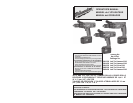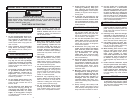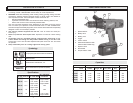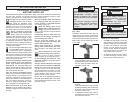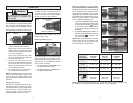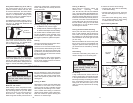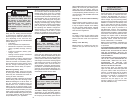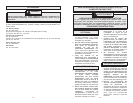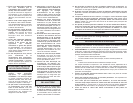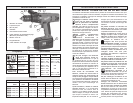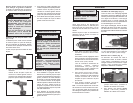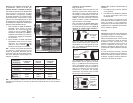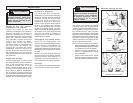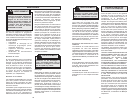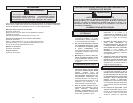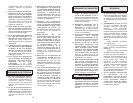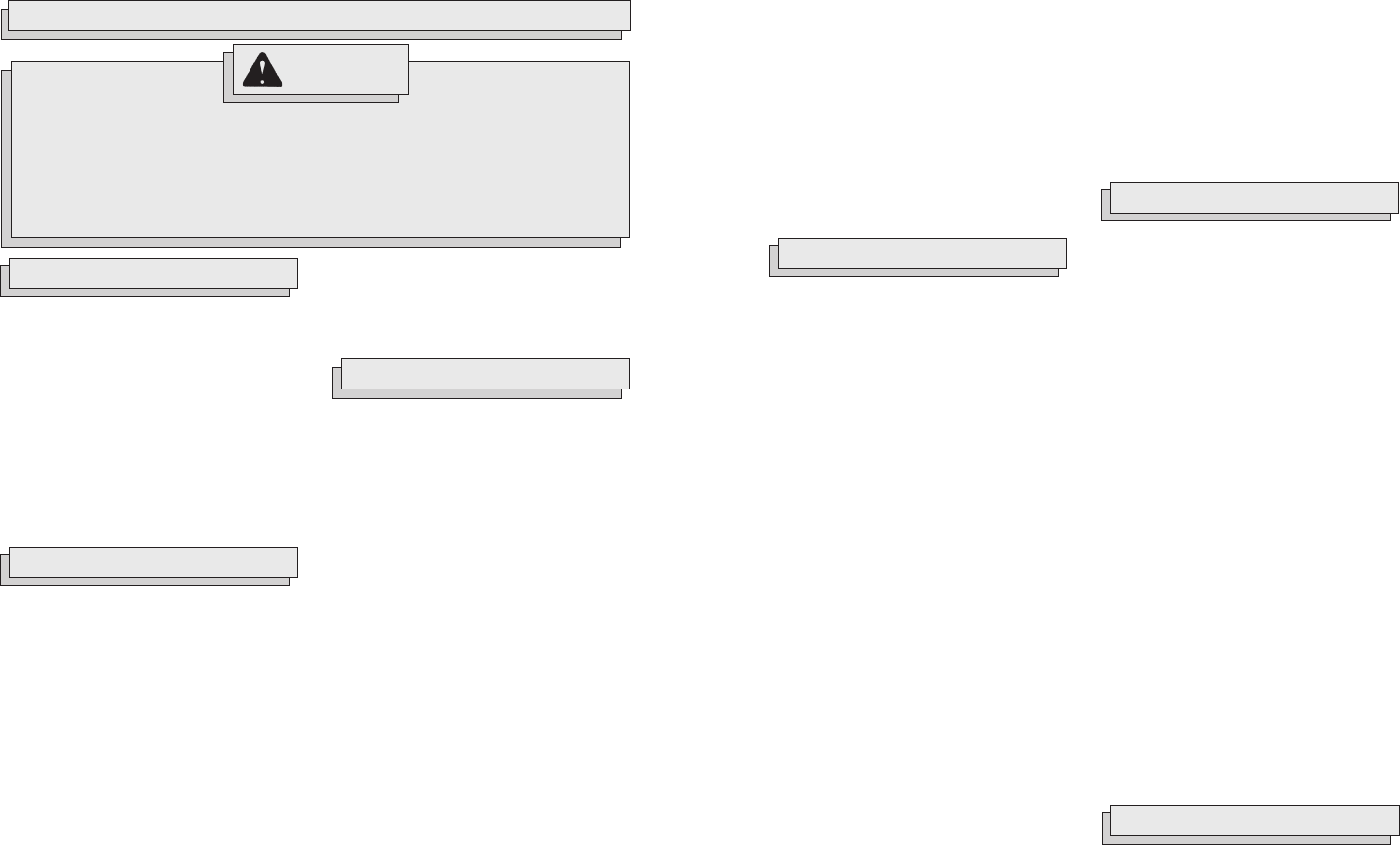
32
POWER TOOL USE AND CARE
16. Do not force the power tool. Use
the correct power tool for your
application. The correct power tool
will do the job better and safer at the
rate for which it was designed.
17. Do not use the power tool if the
switch does not turn it on and off.
Any power tool that cannot be con-
trolled with the switch is dangerous
and must be repaired.
18. Disconnect the plug from the
power source and/or the battery
pack from the power tool before
making any adjustments, chang-
ing accessories, or storing
power tools. Such preventive safety
measures reduce the risk of starting
the tool accidentally.
19. Store idle power tools out of the
reach of children and do not al-
low persons unfamiliar with the
power tools or these instructions
to operate power tools. Power
tools are dangerous in the hands of
untrained users.
20. Maintain power tools. Check for
misalignment or binding of mov-
ing parts, breakage of parts and
any other condition that may af-
fect the power tool's operation. If
damaged, have the power tool
repaired before use. Many acci-
dents are caused by poorly maintained
power tools.
21. Keep cutting tools sharp and
clean. Properly maintained cutting
tools with sharp cutting edges are less
likely to bind and are easier to control.
SERVICE
28. Have your power tool serviced by
a qualified repair person using
only identical replacement parts.
This will ensure that the safety of the
power tool is maintained.
14. Dress properly. Do not wear loose
clothing or jewellery. Keep your
hair, clothing and gloves away
from moving parts. Loose clothes,
jewellery, or long hair can be caught in
moving parts.
15. If devices are provided for the
connection of dust extraction and
collection facilities, ensure these
are connected and properly used.
Use of these devices can reduce dust-
related hazards.
22. Use the power tool, accessories
and tool bits etc., in accordance
with these instructions and in the
manner intended for the particu-
lar type of power tool, taking into
account the working conditions
and the work to be performed.
Use of the power tool for operations
different from those intended could re-
sult in a hazardous situation.
BATTERY TOOL USE AND CARE
23. Ensure the switch is in the off
position before inserting battery
pack. Inserting the battery pack into
power tools that have the switch on
invites accidents.
24. Recharge only with the charger
specified by the manufacturer. A
charger that is suitable for one type of
battery pack may create a risk of fire
when used with another battery pack.
25. Use power tools only with spe-
cifically designated battery packs.
Use of any other battery packs may
create a risk of injury and fire.
26. When battery pack is not in use,
keep it away from other metal
objects like paper clips, coins,
keys, nails, screws, or other
small metal objects that can make
a connection from one terminal
to another. Shorting the battery ter-
minals together may cause burns or a
fire.
27. Under abusive conditions, liquid
may be ejected from the battery,
avoid contact. If contact acciden-
tally occurs, flush with water. If
liquid contacts eyes, additionally
seek medical help. Liquid ejected
from the battery may cause irritation
or burns.
WORK AREA SAFETY
ELECTRICAL SAFETY
PERSONAL SAFETY
WARNING!
READ ALL INSTRUCTIONS
Failure to follow all instructions listed below may result in electric shock, fire
and/or serious injury. The term "power tool" in all of the warnings listed
below refers to your mains-operated (corded) power tool or battery-
operated (cordless) power tool.
SAVE THESE INSTRUCTIONS
GENERAL SAFETY RULES-FOR ALL BATTERY OPERATED TOOLS
1. Keep work area clean and well lit.
Cluttered or dark areas invite accidents.
2. Do not operate power tools in ex-
plosive atmospheres, such as in
the presence of flammable liq-
uids, gases, or dust. Power tools
create sparks which may ignite the
dust or fumes.
3. Keep children and bystanders
away while operating a power
tool. Distractions can cause you to
lose control.
4. Power tool plugs must match the
outlet. Never modify the plug in
any way. Do not use any adapter
plugs with earthed (grounded)
power tools. Unmodified plugs and
matching outlets will reduce risk of
electric shock.
5. Avoid body contact with earthed
or grounded surfaces such as
pipes, radiators, ranges and re-
frigerators. There is an increased
risk of electric shock if your body is
earthed or grounded.
6. Do not expose power tools to rain
or wet conditions. Water entering a
power tool will increase the risk of
electric shock.
7. Do not abuse the cord. Never use
the cord for carrying, pulling, or
unplugging the power tool. Keep
cord away from heat, oil, sharp
edges, or moving parts. Damaged
or entangled cords increase the risk
of electric shock.
9. Stay alert, watch what you are
doing and use common sense
when operating a power tool. Do
not use a power tool while you
are tired or under the influence
of drugs, alcohol or medication. A
moment of inattention while operating
power tools may result in serious per-
sonal injury.
10. Use safety equipment. Always
wear eye protection. Safety equip-
ment such as dust mask, non-skid
safety shoes, hard hat, or hearing pro-
tection used for appropriate conditions
will reduce personal injuries.
11. Avoid accidental starting. Ensure
the switch is in the off-position
before plugging in. Carrying tools
with your finger on the switch or plug-
ging in power tools that have the
switch on invites accidents.
12. Remove any adjusting key or
wrench before turning the power
tool on. A wrench or a key left at-
tached to a rotating part of the power
tool may result in personal injury.
13. Do not overreach. Keep proper
footing and balance at all times.
This enables better control of the
power tool in unexpected situations.
8. When operating a power tool out-
doors, use an extension cord suit-
able for outdoor use. Use of a cord
suitable for outdoor use reduces the
risk of electric shock.



